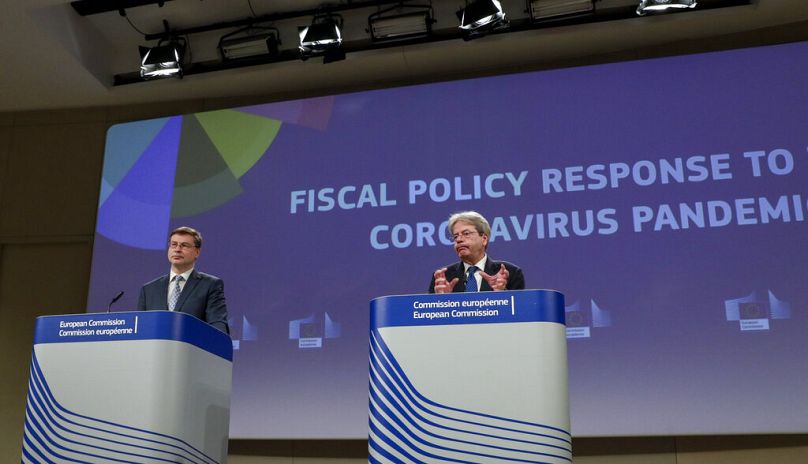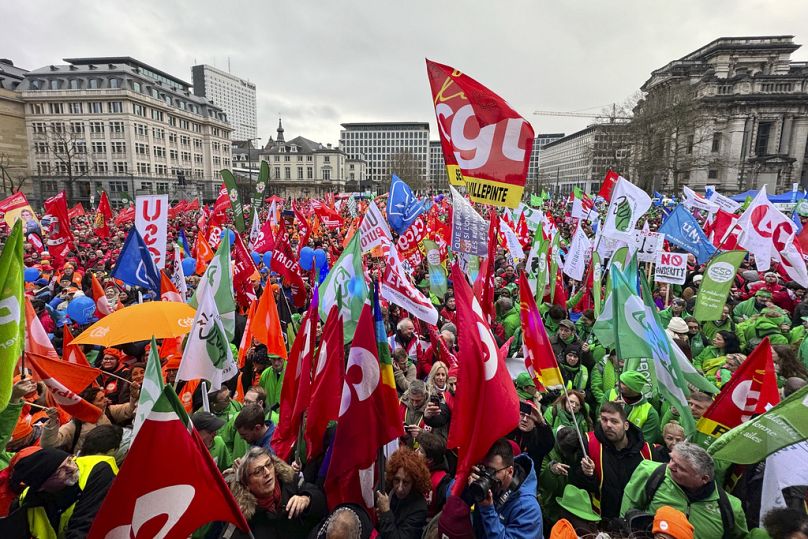The extraordinary nature of the pandemic led to unprecedented acts; today, similarly, the impending threat of the climate crisis on our planet, and its consequences on the very foundations of our society, require responses that rise to the occasion, Eleonora Volpe writes.
On 11 December, the European Economic and Social Committee met to discuss the proposal for new fiscal rules for the EU.
The next day, we met, together with Belgian and European trade unions, in a demonstration against the dangerous outcome of their proposal.
As More than Enough, a coalition of social organisations, unions, anti-poverty and environmental NGOs, we are profoundly worried about the unjustifiably restricting nature of the proposed text.
It is high time for European finance ministers to balance objectives of debt sustainability with the greatest form of instability that we face today: the climate and environmental crisis.
The journey towards climate neutrality requires a profound reconsideration of our economies and societies. We need significant investments by national governments in a transition that is truly green and truly socially just.
This should not be at odds with fiscal obligations of how much a country can spend for its citizens' wellbeing; on the contrary, fiscal rules that are fit for purpose can be catalysts for objectives of climate and social justice.
The proposed fiscal rules fall short of the changes we need. A 20th-century-old obsession with debt reduction, at a moment when humanity faces unprecedented climate, environmental and social threats is irresponsible and dangerous, as it risks restricting the means with which national governments will be able to address the coming challenges.
There will be no debt sustainability without a serious commitment to a sustainable future.
We need responses that rise to the occasion
Let’s take a step back. Amidst the COVID-19 crisis, at a time when national governments had to respond promptly to the global health emergency, the fiscal rules were suspended temporarily until 2024.
The temporary suspension allowed greater flexibility to Member States to address the economic challenges ahead and avoid the constraining nature of the fiscal rules leading to an even more severe economic downturn.
Even before the onset of COVID-19, these rules had been the subject of much debate: their arbitrary nature constrained member states’ spending, often hindering national governments from effectively and promptly addressing economic crises and downturns and forcing cuts in social spending (without being effective in decreasing debt levels).
Today we are living in a parallel situation.
The extraordinary nature of the pandemic led to unprecedented acts; today, similarly, the impending threat of the climate crisis on our planet, and its consequences on the very foundations of our society, require responses that rise to the occasion.
The temporary suspension of the fiscal rules represented the perfect opportunity for their profound reconsideration and the chance for a paradigm shift from an economy that has measured its prosperity only in terms of a growth rate and its stability only in terms of a debt ratio.
The resulting environmental and social scarring is where we now start, fighting for an economy of social well-being and environmental prosperity, with no compromise between the two.
One-size-fits-all approach doesn't work
The seriousness of the situation is well known in EU headquarters: according to the European Commission’s own estimates, the EU’s current underspending in its 2050 climate targets is staggering, ranging between €11,7 and €16,3 billion.
This adds to economic and social scarring coming from years of pursuing harsh austerity, such as cuts in social spending, that have hit the most vulnerable Europeans - youth, workers, women, and minorities, leaving them poorer and more vulnerable.
Failing to address this with the right tools and means will only contribute to making our economies more vulnerable to climate impacts and our societies more fragmented and polarised.
Yet, the text that is being discussed falls short of the transformative change we need.
By mostly focusing on yearly objectives for debt reduction, it neglects the need for proper fiscal space for public investments that are essential to foster a fair green transition and overlooks the highly beneficial effect that quality public investments (especially in climate) have on the overall economy (and as such repayment of debt).
By surrendering to the pressures of countries like Germany, the proposal lands on a one-size-fits-all agreement that will mostly affect those countries already grappling with the aftermath of austerity, the COVID-19 crisis and the energy crisis.
Overall, the proposal would unjustifiably restrict investments that are urgently needed for a just transition. By imposing a strict debt reduction, national governments would not be allowed enough fiscal leeway to invest in either the green or social dimension, and paradoxically putting the two priorities in competition.
The looming possibility of a bad deal
Unless these rules are improved significantly, they're not going to help keep debts in check in the long term.
They're going to stand in the way of most member states hitting their climate, jobs, and social targets.
What European citizens really need is a deal that shows we've learned from the past and gives governments the tools to actively invest in meeting the EU's climate, social, and economic goals.
Rushing a deal now would leave us unprepared for the challenges of the next decade.
Finance ministers must consider the broader plea coming from civil society. More than Enough, together with many other civil society organisations in Belgium, is calling for fiscal rules that empower national governments to make the necessary structural investments for a prosperous and resilient future.
Let us not settle for a hurried agreement that locks us into insufficient fiscal capacity, impeding the realisation of climate, employment, and social targets. We cannot allow the return of austerity through the back door.
Eleonora Volpe is Finance Officer at the European Environmental Bureau (EEB).
At Euronews, we believe all views matter. Contact us at view@euronews.com to send pitches or submissions and be part of the conversation.


